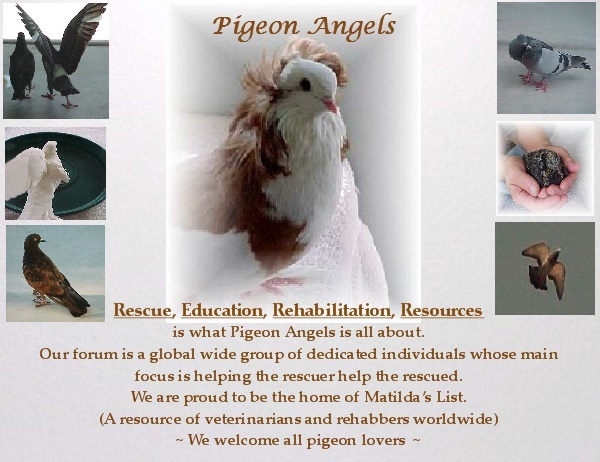Matilda
Special Pigeon Angel

Posts : 9198
Join date : 2009-01-11
Location : Pacific Northwest of the United States of America
 |  Subject: A Must Read about Worms Subject: A Must Read about Worms  Sun Jan 17, 2010 2:19 pm Sun Jan 17, 2010 2:19 pm | |
| | |
|
Teresa
Administrative Member

Posts : 5381
Join date : 2009-07-23
Location : Portugal
 |  Subject: Re: A Must Read about Worms Subject: Re: A Must Read about Worms  Sun Jan 17, 2010 2:51 pm Sun Jan 17, 2010 2:51 pm | |
| Best informed article about worms I have ever come across. Thank you for posting it, Charis.
It was very interesting what he said about worm, and especially coccidial infection, being the consequence, and not the cause of a bird's failing health; and the fact that too much hygiene may not be a good thing. Definitely a must read! | |
|
Matilda
Special Pigeon Angel

Posts : 9198
Join date : 2009-01-11
Location : Pacific Northwest of the United States of America
 |  Subject: From...birdmedicine.org Subject: From...birdmedicine.org  Fri Feb 12, 2010 8:34 pm Fri Feb 12, 2010 8:34 pm | |
| The commonly used anthelminitic drugs Fenbendazole and Albendazole are toxic to pigeons. 410 pigeons of various species at San Diego Zoo and San Diego Wild Animal Park were examined alive or dead. All birds were healthy at the start point, and kept during a period of 45 days because of quarantine, relocation, or presale health cheque for observation. The symptoms looked for were weight change, leukopenia (too few white blood cells), bone marrow changes (less or more bone marrow than normal), small intestinal changes (injuries of the inner lining of the intestines, coursing diarrhoea and malabsorption) and survival. The results looked as follows: | Treatment given | Weight | Leukopenia | Bone Marrow | Intestinal | Survival | | No treatment | Up 4,6 % | 12 % | 33 % Better | All normal | 91,7 % | | Albendazole | Down 13,3 % | 100 % | 83 % worse | 77,8 % injured | 66,7 % | | Fenbendazole low | Down 8,3 % | 83.3 % | 78 % worse | 91,7 % injured | 75,4 % | | Fenbendazole high | Down 18,8 % | 100 % | 30 % worse | 50 % injured | 66,7 % |
What seems obvious is that both the drugs are disadvantageous to the pigeons. In all cases the pigeons loos weight after a treatment. Also, most pigeons develop leucopoenia. The fewer white blood cells in the medicated pigeons cause them more susceptible to bacteria and other microbial intruders. This might explain why the survival rate of the treated pigeons is lower then the untreated (controls). Most pigeons that died suffered from an infection. The bone marrow in involved in the production of blood cells, and in the treated birds the bone marrow was suppressed. Furthermore, the majority of the birds get more or less injured intestines, probably from these drugs. So, why should we give the pigeons one of these drugs? Actually, this report point very strongly that these drugs must never be used unless they are absolutely needed. If you think the birds have got worms, the droppings must be tested by a veterinarian or a parasitologist to confirm the diagnosis. The best would be to test the droppings from each single pigeon, and only treat the birds were worm eggs are found. If intestinal worm infection is diagnosed on the loft, cleaning is very important to get rid of worm eggs in the dung. If you want to give any medication, any remedy containing albendazole ( like "Valbazen") and fenbendazole (like "Panacur") should be avoided. Because chemical similarity, it is likely that also flubendazole (like "Flunebol"), is harmful to pigeons. | |
|
Matilda
Special Pigeon Angel

Posts : 9198
Join date : 2009-01-11
Location : Pacific Northwest of the United States of America
 |  Subject: A must listen about how worms infect Subject: A must listen about how worms infect  Sun Apr 04, 2010 12:29 pm Sun Apr 04, 2010 12:29 pm | |
| | |
|
Sponsored content
 |  Subject: Re: A Must Read about Worms Subject: Re: A Must Read about Worms  | |
| |
|


